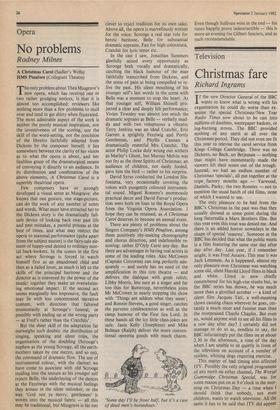Opera
No problems
Rodney Mines
The only problem about Thea Musgrave's new opera, which has received one or two rather grudging notices, is that it is almost too accomplished: reviewers like nothing more than a few problems to mull over and tend to get shirty when frustrated. The most admirable aspect of the work is neither the purely musical inspiration, nor the inventiveness of the scoring, nor the skill of the word-setting, nor the concision of the libretto faithfully adapted from Dickens by the composer herself; it lies somewhere between the clarity of her vision as to what the opera is about, and her faultless grasp of the dramaturgical means of conveying it directly to an audience. In its distribution and combination of the above elements, A Christmas Carol is a superbly theatrical opera.
Few composers have so strongly developed a visual sense as Musgrave: she knows that one gesture, one stage-picture, can do the work of any number of notes and words. What must have attracted her to the Dickens story is the dramatically fail- safe device of looking back over past life and past mistakes, a painful process at the best of times, and what may restrict the opera to seasonal performance (quite apart from the subject matter) is the fairy-tale ele- ment of happy-end denied to ordinary mor- tal back-lookers. In the scenes in the first act where Scrooge is forced to watch himself first as an abandoned child and then as a failed lover, as much is left to the skills of the principal baritone and the director as is conveyed by the power of the music: together they make an overwhelm- ing emotional impact. If the second act seems marginally less impressive, the fault may lie with less concentrated narrative content, with direction that faltered momentarily at Scrooge's funeral, or possibly with ending up at the wrong party — at Fred's rather than the Cratchits'.
But the sheer skill of the adaptation far outweighs such doubts: the distribution of singing, speaking and silent roles, the organisation of the doubling (Scrooge's nephew as the young Scrooge, all the earth- mothers taken by one mezzo, and so on), the command of dramatic flow. The use of instrumental colour, with the clarinet we have come to associate with old Scrooge stealing into the texture as his younger self rejects Belle, the underlaying of the dances at the Fezziwigs with the musical feelings they arouse in the silent onlooker, or the way 'God rest ye merry, gentlemen' is woven into the musical fabric — all this may be traditional, but Musgrave is far too clever to reject tradition for its own sake. Above all, the opera is marvellously written for the voice: Scrooge a real star role for heroic baritone, Belle for substantial dramatic soprano, Fan for high coloratura, Cratchit for lyric tenor etc.
In the cast I saw, Jonathan Summers gleefully seized every opportunity as Scrooge both vocally and dramatically, catching the black humour of the man faithfully transcribed from Dickens, and the sense of pain at being compelled to re- live the past. His silent mouthing of his younger self's last words in the scene with Belle was a moment to stop the heart. As ' that younger self, William Shimell pro- jected a clear and deeply felt performance; Vivien Townley was almost too much the dramatic soprano as Belle — verbally mud- dy and with two voluptuous a vibrato; Terry Jenkins was an ideal Cratchit, Eric Garrett a sprightly Fezziwig and Portly Gentleman, and Phyllis Cannan a dramatically resentful Mrs Cratchit. The actor Philip Locke duly wrung our withers as Marley's Ghost, but Murray Melvin was too fey as the three Spirits of Christmas: an audience of children, not easily fooled, gave him the bird — rather to his surprise.
David Syrus conducted the London Sin- fonietta, very occasionally covering the voices with pungently coloured instrumen- tal sound. Miguel Romero's enormously practical decor and David Farrar's produc- tion were both on loan to the Royal Opera from the Virginia Opera Association. 1 hope they can be retained, as A Christmas Carol deserves to become an annual event.
There are plenty of problems about the Singers Company's HMS Pinafore, among them positively shy-making choreography and chorus direction, and indefensible re- scoring: rather D'Oyly Carte any day. But there are advantages in having real actors in some of the leading roles. Alec McCowen (Captain Corcoran) can sing perfectly ade- quately — and surely has no need of the amplification in this tiny theatre — and delivers the dialogue with great relish; Libby Morris, less sure as a singer and far too thin for Buttercup, nevertheless joins Mr McCowen in nearly stopping the show with 'Things are seldom what they seem'; and Ronnie Stevens, a good singer, catches the parvenu condescension as well as the camp humour of the First Sea Lord. In these hands all the icy little class-jokes are safe. Janis Kelly (Josephine) and Mike Bulman (Ralph) deliver the more conven- tional operetta goods with much charm.
`Some day I'll be front half, but it's a case of dead men's horseshoes.' Even though Sullivan wins in the end — his tunes happily prove indestructible — this is more an evening for Gilbert fanciers, and as such recommendable.


































 Previous page
Previous page